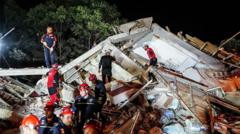In the aftermath of a devastating 7.7-magnitude earthquake in Myanmar, countries like China, Russia, and several Southeast Asian nations swiftly dispatched aid, while the U.S. response has been notably slow. This contrasts with America's historical role as a leader in foreign assistance, drawing criticism regarding its commitment to humanitarian aid under the Trump administration.
U.S. Aid Response Critiqued as Other Nations Aid Myanmar Earthquake Victims

U.S. Aid Response Critiqued as Other Nations Aid Myanmar Earthquake Victims
As international responses flood into Myanmar post-earthquake, the U.S. faces scrutiny for its delayed response amid U.S.A.I.D. cuts.
China, Russia, and India have quickly mobilized emergency response teams and supplies to assist the earthquake victims in Myanmar, while nations such as Thailand, Malaysia, and Vietnam have also contributed aid. By contrast, the United States, traditionally a leader in global humanitarian assistance, has been conspicuously absent in its response to the disaster.
Despite former President Trump's claims that support was forthcoming for the country following the catastrophic 7.7-magnitude earthquake that resulted in over 1,700 deaths, U.S. action has lagged behind that of other countries. Information suggests that a U.S.A.I.D. assessment team will not arrive until mid-week, further delaying the overall American response, which has been described as unusually slow compared to previous disaster relief efforts.
Chinese search-and-rescue teams, equipped with trained dogs and medical supplies, have already reached Mandalay, one of the most affected areas. China has pledged $14 million toward earthquake relief and is actively engaged in rescue operations.
Michael Schiffer, who served as assistant administrator for the U.S.A.I.D. bureau for Asia earlier this year, noted the geopolitical implications of the U.S. response. He emphasized that American humanitarian efforts enhance its foreign policy image, and if the U.S. fails to respond adequately, the actions of countries like China could convey a powerful message about U.S. commitment to global aid.
This situation raises questions about America's role in international humanitarian efforts and the potential implications of prioritizing other areas over foreign aid during global crises.



















